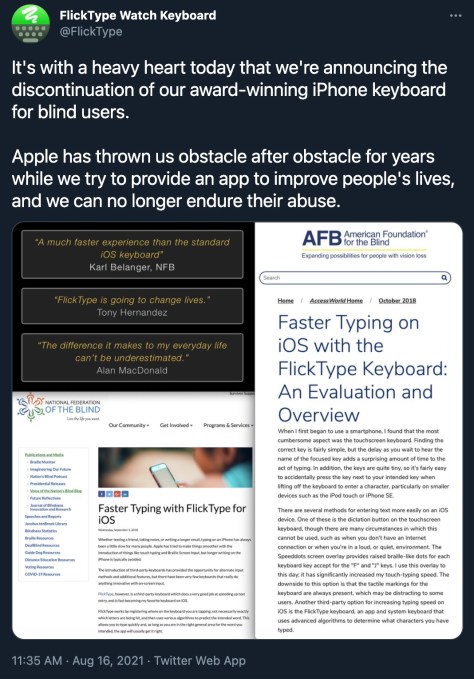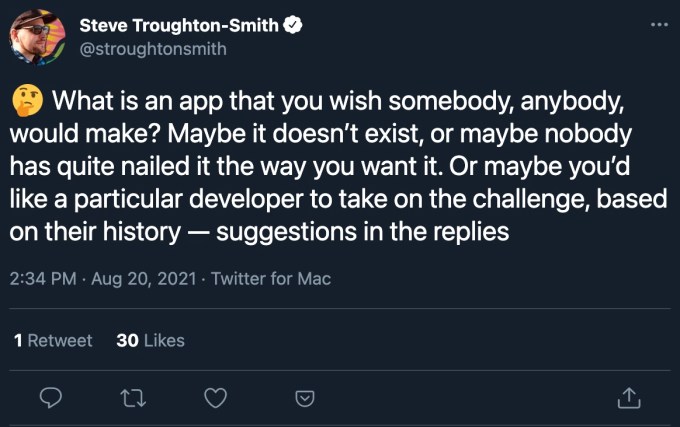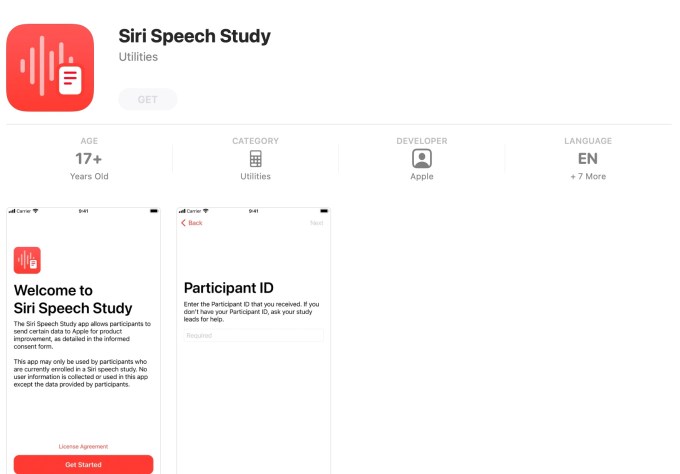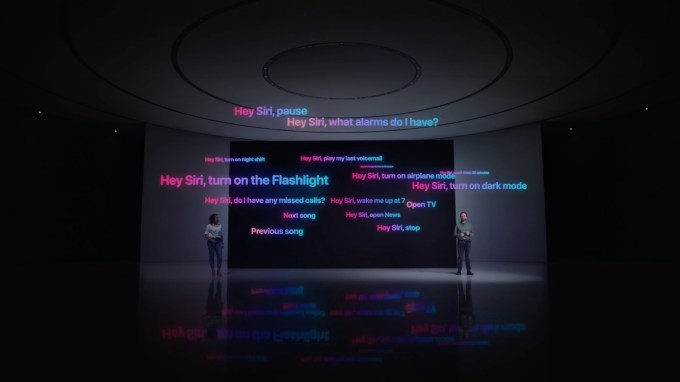Welcome back to This Week in Apps, the weekly TechCrunch series that recaps the latest in mobile OS news, mobile applications and the overall app economy.
The app industry continues to grow, with a record 218 billion downloads and $143 billion in global consumer spend in 2020. Consumers last year also spent 3.5 trillion minutes using apps on Android devices alone. And in the U.S., app usage surged ahead of the time spent watching live TV. Currently, the average American watches 3.7 hours of live TV per day, but now spends four hours per day on their mobile devices.
Apps aren’t just a way to pass idle hours — they’re also a big business. In 2019, mobile-first companies had a combined $544 billion valuation, 6.5x higher than those without a mobile focus. In 2020, investors poured $73 billion in capital into mobile companies — a figure that’s up 27% year-over-year.
This Week in Apps offers a way to keep up with this fast-moving industry in one place with the latest from the world of apps, including news, updates, startup fundings, mergers and acquisitions, and suggestions about new apps and games to try, too.
Do you want This Week in Apps in your inbox every Saturday? Sign up here: techcrunch.com/newsletters
Top Stories
OnlyFans to ban sexually explicit content
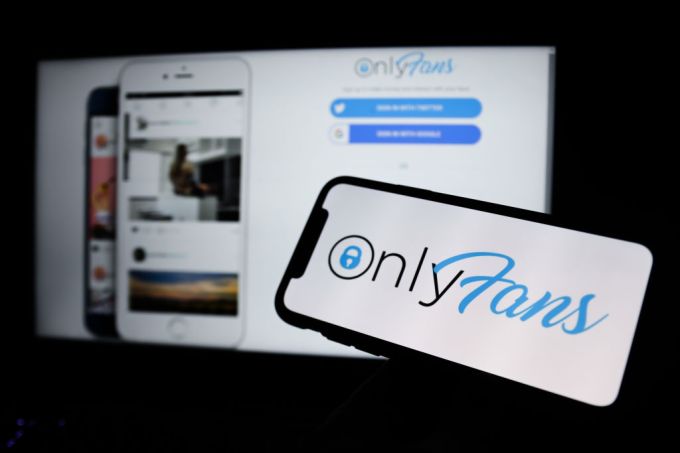
(Photo Illustration by Jakub Porzycki/NurPhoto via Getty Images)
Creator platform OnlyFans is getting out of the porn business. The company announced this week it will begin to prohibit any “sexually explicit” content starting on October 1, 2021 — a decision it claimed would ensure the long-term sustainability of the platform. The news angered a number of impacted creators who weren’t notified ahead of time and who’ve come to rely on OnlyFans as their main source of income.
However, word is that OnlyFans was struggling to find outside investors, despite its sizable user base, due to the adult content it hosts. Some VC firms are prohibited from investing in adult content businesses, while others may be concerned over other matters — like how NSFW content could have limited interest from advertisers and brand partners. They may have also worried about OnlyFans’ ability to successfully restrict minors from using the app, in light of what appears to be soon-to-come increased regulations for online businesses. Plus, porn companies face a number of other issues, too. They have to continually ensure they’re not hosting illegal content like child sex abuse material, revenge porn or content from sex trafficking victims — the latter which has led to lawsuits at other large porn companies.
The news followed a big marketing push for OnlyFans’ porn-free (SFW) app, OFTV, which circulated alongside reports that the company was looking to raise funds at a $1 billion+ valuation. OnlyFans may not have technically needed the funding to operate its current business — it handled more than $2 billion in sales in 2020 and keeps 20%. Rather, the company may have seen there’s more opportunity to cater to the “SFW” creator community, now that it has big names like Bella Thorne, Cardi B, Tyga, Tyler Posey, Blac Chyna, Bhad Bhabie and others on board.
U.S. lawmakers demand info on TikTok’s plans for biometric data collection
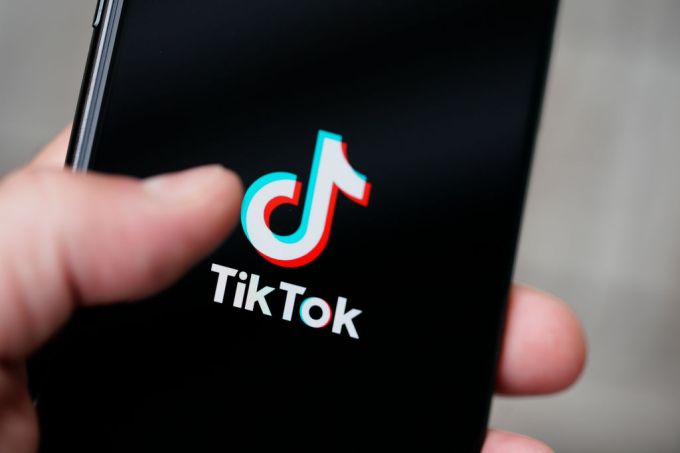
The TikTok logo is seen on an iPhone 11 Pro max. Image Credits: Nur Photo/Getty Images
U.S. lawmakers are challenging TikTok on its plans to collect biometric data from its users. TechCrunch first reported on TikTok’s updated privacy policy in June, where the company gave itself permission to collect biometric data in the U.S., including users’ “faceprints and voiceprints.” When reached for comment, TikTok could not confirm what product developments necessitated the addition of biometric data to its list of disclosures about the information it automatically collects from users, but said it would ask for consent in the case such data collection practices began.
Earlier this month, Senators Amy Klobuchar (D-MN) and John Thune (R-SD) sent a letter to TikTok CEO Shou Zi Chew, which said they were “alarmed” by the change, and demanded to know what information TikTok will be collecting and what it plans to do with the data. This wouldn’t be the first time TikTok got in trouble for excessive data collection. Earlier this year, the company paid out $92 million to settle a class-action lawsuit that claimed TikTok had unlawfully collected users’ biometric data and shared it with third parties.
Weekly News
Platforms: Apple
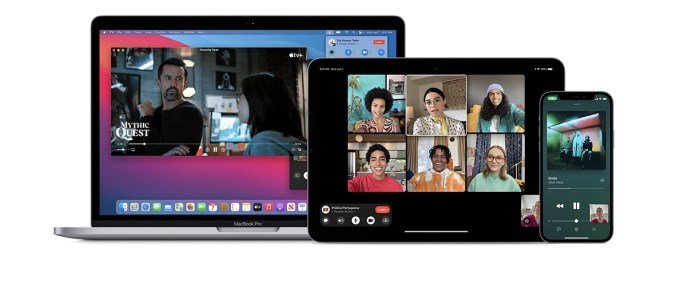
Image Credits: Apple
 Apple told developers that some of the features it announced as coming in iOS 15 won’t be available at launch. This includes one of the highlights of the new OS, SharePlay, a feature that lets people share music, videos and their screen over FaceTime calls. Other features that will come in later releases include Wallet’s support for ID cards, the App Privacy report and others that have yet to make it to beta releases.
Apple told developers that some of the features it announced as coming in iOS 15 won’t be available at launch. This includes one of the highlights of the new OS, SharePlay, a feature that lets people share music, videos and their screen over FaceTime calls. Other features that will come in later releases include Wallet’s support for ID cards, the App Privacy report and others that have yet to make it to beta releases.- Apple walked back its controversial Safari changes with the iOS 15 beta 6 update. Apple’s original redesign had shown the address bar at the bottom of the screen, floating atop the page’s content. Now the tab bar will appear below the page’s content, offering access to its usual set of buttons as when it was at the top. Users can also turn off the bottom tab bar now and revert to the old, Single Tab option that puts the address bar back at the top as before.
- In response to criticism over its new CSAM detection technology, Apple said the version of NeuralHash that was reverse-engineered by a developer, Asuhariet Ygvar, was a generic version, and not the complete version that will roll out later this year.
- The Verge dug through over 800 documents from the Apple-Epic trial to find the best emails, which included dirt on a number of other companies like Netflix, Hulu, Sony, Google, Nintendo, Valve, Microsoft, Amazon and more. These offered details on things like Netflix’s secret arrangement to pay only 15% of revenue, how Microsoft also quietly offers a way for some companies to bypass its full cut, how Apple initially saw the Amazon Appstore as a threat and more.
Platforms: Google
- A beta version of the Android Accessibility Suite app (12.0.0) which rolled out with the fourth Android beta release added something called “Camera Switches” to Switch Access, a toolset that lets you interact with your device without using the touchscreen. Camera Switches allows users to navigate their phone and use its features by making face gestures, like a smile, open mouth, raised eyebrows and more.
- Google announced its Pixel 5a with 5G, the latest A-series Pixel phone, will arrive on August 27, offering IP67 water resistance, long-lasting Adaptive Battery, Pixel’s dual-camera system and more, for $449. The phone makes Google’s default Android experience available at a lower price point than the soon to arrive Pixel 6.
- An unredacted complaint from the Apple-Epic trial revealed that Google had quietly paid developers hundreds of millions of dollars via a program known as “Project Hug,” (later “Apps and Games Velocity Program”) to keep their games on the Play Store. Epic alleges Google launched the program to keep developers from following its lead by moving their games outside the store.
Augmented Reality
- Snap on Thursday announced it hired its first VP of Platform Partnerships to lead AR, Konstantinos Papamiltiadis (“KP”). The new exec will lead Snap’s efforts to onboard partners, including individual AR creators building via Lens Studio as well as large companies that incorporate Snapchat’s camera and AR technology (Camera Kit) into their apps. KP will join in September, and report to Ben Schwerin, SVP of Content and Partnerships.
Fintech
- Crypto exchange Coinbase will enter the Japanese market through a new partnership with Japanese financial giant Mitsubishi UFJ Financial Group (MUFG). The company said it plans to launch other localized versions of its existing global services in the future.
Social
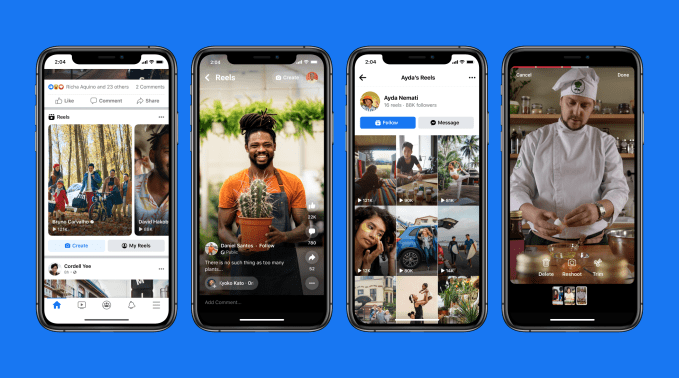
Image Credits: Facebook
- Facebook launched a “test” of Facebook Reels in the U.S. on iOS and Android. The new feature brings the Reels experience to Facebook, allowing users to create and share short-form video content directly within the News Feed or within Facebook Groups. Instagram Reels creators can also now opt in to have their Reels featured on users’ News Feed. The company is heavily investing its its battle with TikTok, even pledging that some portion of its $1 billion creator fund will go toward Facebook Reels.
- Twitter’s redesign of its website and app was met with a lot of backlash from users and accessibility experts alike. The company choices add more visual contrast between various elements and may have helped those with low vision. But for others, the contrast is causing strain and headaches. Experts believe accessibility isn’t a one-size fits all situation, and Twitter should have introduced tools that allowed people to adjust their settings to their own needs.
- Twitter also tapped crypto developer Jay Graber to head the company’s “bluesky” project, which aims to create a decentralized social media protocol on which a number of networks, including Twitter, will eventually operate. The project will operate independently from Twitter, but is funded by Twitter and run by Twitter employees. Elsewhere, Twitter rolled out a new option that would allow users to report misinformation.
- Twitter added Spaces support to its API, allowing developers to build Spaces discovery tools, and later, tools for hosts.
- YikYak returned, under new management. The once-popular anonymous social network relaunched on iOS this week under new anonymous ownership from people who clearly hope a do-over will lead to different results. The original version of the app shut down in 2017 after being plagued by cyberbullying.
- The pro-Trump Twitter alternative Gettr’s lack of moderation has allowed users to share child exploitation images, according to research from the Stanford Internet Observatory’s Cyber Policy Center.
- Pinterest rolled out a new set of more inclusive search filters that allow people to find styles for different types of hair textures — like coily, curly, wavy, straight, as well as shaved or bald and protective styles.
Photos
- Photoshop for iPad gained new image correction tools, including the Healing Brush and Magic Wand, and added support for connecting an iPad to external monitors via HDMI or USB-C. The company also launched a Photoshop Beta program on the desktop.
Messaging
- WhatsApp is being adopted by the Taliban to spread its message across Afghanistan, despite being on Facebook’s list of banned organizations. The company says it’s proactively removing Taliban content — but that may be difficult to do since WhatsApp’s E2E encryption means it can’t read people’s texts. This week, Facebook shut down a Taliban helpline in Kabul, which allowed civilians to report violence and looting, but some critics said this wasn’t actually helping local Afghans, as the group was now in effect governing the region.
- WhatsApp is also testing a new feature that will show a large preview when sharing links, which some suspect may launch around the time when the app adds the ability to have the same account running on multiple devices.
Streaming & Entertainment
- Netflix announced it’s adding spatial audio support on iPhone and iPad on iOS 14, joining other streamers like HBO Max, Disney+ and Peacock that have already pledged to support the new technology. The feature will be available to toggle on and off in the Control Center, when it arrives.
- Blockchain-powered streaming music service Audius partnered with TikTok to allow artists to upload their songs using TikTok’s new SoundKit in just one click.
- YouTube’s mobile app added new functionality that allows users to browse a video’s chapters, and jump into the chapter they want directly from the search page.
- Spotify’s Anchor app now allows users in global markets to record “Music + Talk” podcasts, where users can combine spoken word recordings with any track from Spotify’s library of 70 million songs for a radio DJ-like experience.
- Podcasters are complaining that Apple’s revamped Podcasts platform is not working well, reports The Verge. Podcasts Connect has been buggy, and sports a confusing interface that has led to serious user errors (like entire shows being archived). And listeners have complained about syncing problems and podcasts they already heard flooding their libraries.
Dating
- Tinder announced a new feature that will allow users to voluntarily verify their identity on the platform, which will allow the company to cross-reference sex offender registry data. Previously, Tinder would only check this database when a user signed up for a paid subscription with a credit card.
Gaming

Image Source: The Pokémon Company
- Pokémon Unite will come to iOS and Android on September 22, The Pokémon Company announced during a livestream this week. The strategic battle game first launched on Nintendo Switch in late July.
- Developer Konami announced a new game, Castlevania: Grimoire of Souls, which will come exclusively to Apple Arcade. The game is described as a “full-fledged side-scrolling action game,” featuring a roster of iconic characters from the classic game series. The company last year released another version of Castelvania on the App Store and Google Play.
- Dragon Ball Z: Dokkan Battle has now surpassed $3 billion in player spending since its 2015 debut, reported Sensor Tower. The game from Bandai Namco took 20 months to reach the figure after hitting the $2 billion milestone in 2019. The new landmark sees the game joining other top-grossers, including Clash Royale, Lineage M and others.
- Sensor Tower’s mobile gaming advertising report revealed data on top ad networks in the mobile gaming market, and their market share. It also found puzzle games were among the top advertisers on gaming-focused networks like Chartboost, Unity, IronSource and Vungle. On less game-focused networks, mid-core games were top titles, like Call of Duty: Mobile and Top War.
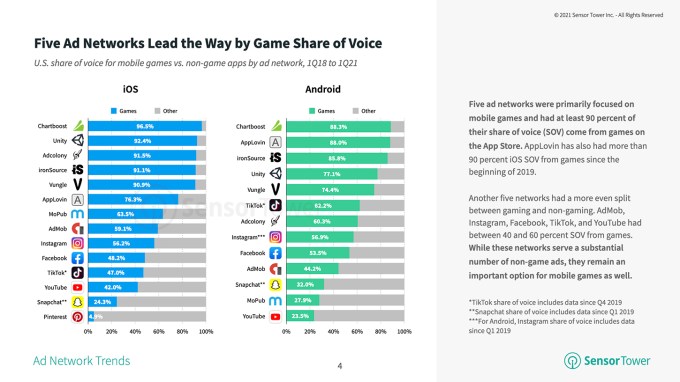
Image Credits: Sensor Tower
Health & Fitness
- Apple is reportedly scaling back HealthHabit, an internal app for Apple employees that allowed them to track fitness goals, talk to clinicians and coaches at AC Wellness (a doctors’ group Apple works with) and manage hypertension. According to Insider, 50 employees had been tasked to work on the project.
- Samsung launched a new product for Galaxy smartphones in partnership with healthcare nonprofit The Commons Project, that allows U.S. users to save a verifiable copy of their vaccination card in the Samsung Pay digital wallet.
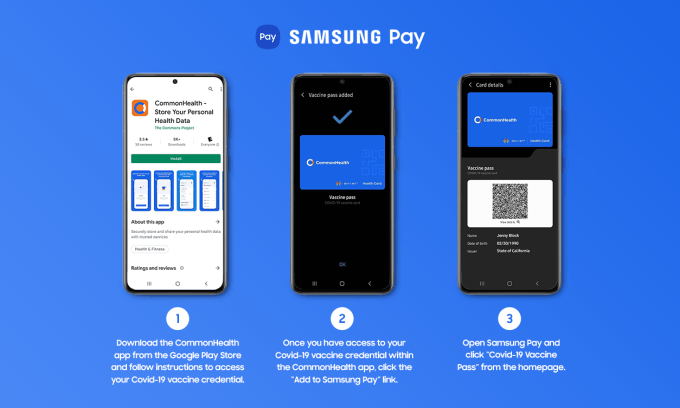
Image Credits: Samsung
Adtech
- Samsung said it’s removing ads shown in its default apps, Samsung Pay, Samsung Weather and Samsung Theme, to address widespread criticism that a flagship phone’s core apps shouldn’t be ruined with ads.
Government & Policy
- China cited 43 apps, including Tencent’s WeChat and an e-reader from Alibaba, for illegally transferring user data. The regulator said the apps had transferred users location data and contact list and harassed them with pop-up windows. The apps have until August 25 to make changes before being punished.
Security & Privacy
- A VICE report reveals a fascinating story about a jailbreaking community member who had served as a double agent by spying for Apple’s security team. Andrey Shumeyko, whose online handles included JVHResearch and YRH04E, would advertise leaked apps, manuals and stolen devices on Twitter and Discord. He would then tell Apple things like which Apple employees were leaking confidential info, which reporters would talk to leakers, who sold stolen iPhone prototypes and more. Shumeyko decided to share his story because he felt Apple took advantage of him and didn’t compensate him for the work.
Funding and M&A
 South Korea’s GS Retail Co. Ltd will buy Delivery Hero’s food delivery app Yogiyo in a deal valued at 800 billion won ($685 million USD). Yogiyo is the second-largest food delivery app in South Korea, with a 25% market share.
South Korea’s GS Retail Co. Ltd will buy Delivery Hero’s food delivery app Yogiyo in a deal valued at 800 billion won ($685 million USD). Yogiyo is the second-largest food delivery app in South Korea, with a 25% market share.
 Gaming platform Roblox acquired a Discord rival, Guilded, which allows users to have text and voice conversations, organize communities around events and calendars and more. Deal terms were not disclosed. Guilded raised $10.2 million in venture funding. Roblox’s stock fell by 7% after the company reported earnings this week, after failing to meet Wall Street expectations.
Gaming platform Roblox acquired a Discord rival, Guilded, which allows users to have text and voice conversations, organize communities around events and calendars and more. Deal terms were not disclosed. Guilded raised $10.2 million in venture funding. Roblox’s stock fell by 7% after the company reported earnings this week, after failing to meet Wall Street expectations.
 Travel app Hopper raised $175 million in a Series G round of funding led by GPI Capital, valuing the business at over $3.5 billion. The company raised a similar amount just last year, but is now benefiting from renewed growth in travel following COVID-19 vaccinations and lifting restrictions.
Travel app Hopper raised $175 million in a Series G round of funding led by GPI Capital, valuing the business at over $3.5 billion. The company raised a similar amount just last year, but is now benefiting from renewed growth in travel following COVID-19 vaccinations and lifting restrictions.
 Indian quiz app maker Zupee raised $30 million in a Series B round of funding led by Silicon Valley-based WestCap Group and Tomales Bay Capital. The round values the company at $500 million, up 5x from last year.
Indian quiz app maker Zupee raised $30 million in a Series B round of funding led by Silicon Valley-based WestCap Group and Tomales Bay Capital. The round values the company at $500 million, up 5x from last year.
 Danggeun Market, the publisher of South Korea’s hyperlocal community app Karrot, raised $162 million in a Series D round of funding led by DST Global. The round values the business at $2.7 billion and will be used to help the company launch its own payments platform, Karrot Pay.
Danggeun Market, the publisher of South Korea’s hyperlocal community app Karrot, raised $162 million in a Series D round of funding led by DST Global. The round values the business at $2.7 billion and will be used to help the company launch its own payments platform, Karrot Pay.
 Bangalore-based fintech app Smallcase raised $40 million in Series C funding round led by Faering Capital and Premji Invest, with participation from existing investors, as well as Amazon. The Robinhood-like app has over 3 million users who are transacting about $2.5 billion per year.
Bangalore-based fintech app Smallcase raised $40 million in Series C funding round led by Faering Capital and Premji Invest, with participation from existing investors, as well as Amazon. The Robinhood-like app has over 3 million users who are transacting about $2.5 billion per year.
 Social listening app Earbuds raised $3 million in Series A funding led by Ecliptic Capital. Founded by NFL star Jason Fox, the app lets anyone share their favorite playlists, livestream music like a DJ or comment on others’ music picks.
Social listening app Earbuds raised $3 million in Series A funding led by Ecliptic Capital. Founded by NFL star Jason Fox, the app lets anyone share their favorite playlists, livestream music like a DJ or comment on others’ music picks.
 U.S. neobank app One raised $40 million in Series B funding led by Progressive Investment Company (the insurance giant’s investment arm), bringing its total raise to date to $66 million. The app offers all-in-one banking services and budgeting tools aimed at middle-income households who manage their finances on a weekly basis.
U.S. neobank app One raised $40 million in Series B funding led by Progressive Investment Company (the insurance giant’s investment arm), bringing its total raise to date to $66 million. The app offers all-in-one banking services and budgeting tools aimed at middle-income households who manage their finances on a weekly basis.
Public Markets
 Indian travel booking app ixigo is looking to raise Rs 1,600 crore in its initial public offering, The Economic Times reported this week.
Indian travel booking app ixigo is looking to raise Rs 1,600 crore in its initial public offering, The Economic Times reported this week.
 Trading app Robinhood disappointed in its first quarterly earnings as a publicly traded company, when it posted a net loss of $502 million, or $2.16 per share, larger than Wall Street forecasts. This overshadowed its beat on revenue ($565 million versus $521.8 million expected) and its more than doubling of MAUs to 21.3 million in Q2. Also of note, the company said dogecoin made up 62% of its crypto revenue in Q2.
Trading app Robinhood disappointed in its first quarterly earnings as a publicly traded company, when it posted a net loss of $502 million, or $2.16 per share, larger than Wall Street forecasts. This overshadowed its beat on revenue ($565 million versus $521.8 million expected) and its more than doubling of MAUs to 21.3 million in Q2. Also of note, the company said dogecoin made up 62% of its crypto revenue in Q2.
Downloads
Polycam (update)

Image Credits: Polycam
3D scanning software maker Polycam launched a new 3D capture tool, Photo Mode, that allows iPhone and iPad users to capture professional-quality 3D models with just an iPhone. While the app’s scanner before had required the use of the lidar sensor built into newer devices like the iPhone 12 Pro and iPad Pro models, the new Photo Mode feature uses just an iPhone’s camera. The resulting 3D assets are ready to use in a variety of applications, including 3D art, gaming, AR/VR and e-commerce. Data export is available in over a dozen file formats, including .obj, .gtlf, .usdz and others. The app is a free download on the App Store, with in-app purchases available.
Jiobit (update)
Jiobit, the tracking dongle acquired by family safety and communication app Life360, this week partnered with emergency response service Noonlight to offer Jiobit Protect, a premium add-on that offers Jiobit users access to an SOS Mode and Alert Button that work with the Jiobit mobile app. SOS Mode can be triggered by a child’s caregiver when they detect — through notifications from the Jiobit app — that a loved one may be in danger. They can then reach Noonlight’s dispatcher who can facilitate a call to 911 and provide the exact location of the person wearing the Jiobit device, as well as share other details, like allergies or special needs, for example.
Tweets
When your app redesign goes wrong…
Prominent App Store critic Kosta Eleftheriou shut down his FlickType iOS app this week after too many frustrations with App Review. He cited rejections that incorrectly argued that his app required more access than it did — something he had successfully appealed and overturned years ago. Attempted follow-ups with Apple were ignored, he said.
Anyone have app ideas?
from Apple – TechCrunch https://ift.tt/2Win6ZK

